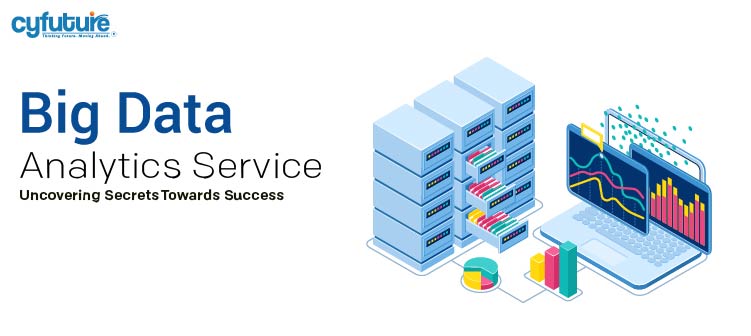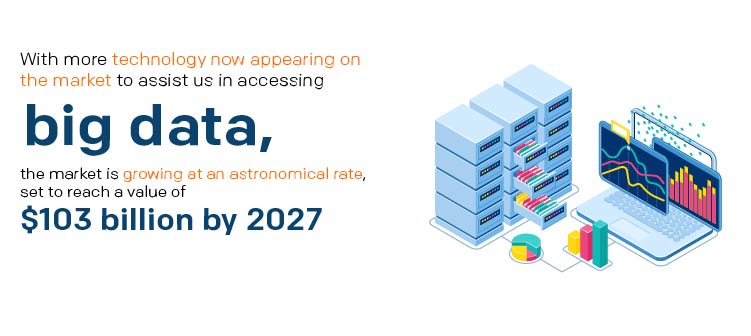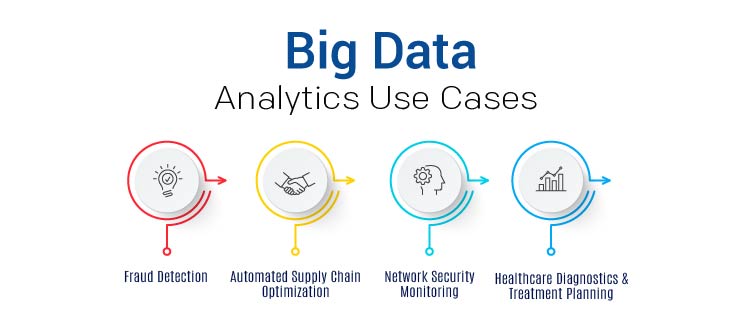-
Get Cloud GPU Server - Register Now!
Toggle navigation

Data is undoubtedly one of an organization’s most important and valuable resources. Anything that delivers any useful information qualifies as data. The value of data keeps rising as a result of the world’s quick development and the development of new technologies. Recognizing the impact and significance of data, many organizations have invested millions of dollars to store and safeguard it from potential threats. Apart from that, the sudden rise in demand for data around the world has given rise to data centers and specialized data facilities. The subject of why and how vital data is to organizations is being raised and this blog aims to answer it.
The above facts and figures clearly define the essence and significance of data in today’s digital landscape. Let us now understand what exactly big data analytics is to nurture our knowledge.
Understanding Big Data Analytics
The challenging process of analyzing large amounts of data to find information that might assist businesses in making wise decisions about their operations, such as hidden patterns, correlations, market trends, and customer preferences, is known as big data analytics. Organizations can analyze data sets and gain new insights using data analytics technology and processes. Basic inquiries regarding business performance and operations are addressed by business intelligence (BI) queries. Advanced analytics, which includes aspects like predictive models, statistical algorithms, and what-if analysis powered by analytics systems, is a subset of big data analytics.

Big data analytics services are crucial because they enable businesses to use their data to find areas for optimization and improvement. Across all corporate sectors, improving efficiency results in more shrewd operations overall, more profits, and happy customers. Big data analytics aids businesses in cost-cutting and the creation of superior, client-focused goods and services.
Data analytics assists in generating insights that enhance how our society operates. Big data analytics in the healthcare industry is essential for tracking and analyzing individual patient records as well as for monitoring outcomes on a global level. Big data helped health ministries in each country’s government decide how to handle vaccinations during the COVID-19 pandemic and come up with strategies for preventing pandemic outbreaks in the future.
Various tools of big data analytics service can dramatically increase operational effectiveness. Big Data technologies connect with customers or clients and gather their insightful comments in order to compile significant amounts of usable customer data. The customer’s tastes, purchasing patterns, and other relevant hidden insights can then be extracted from this data through analysis and interpretation, enabling businesses to develop customized goods and services. Big Data Analytics can locate and examine the most recent market trends, giving you an advantage over your rivals. These services have the ability to automate repetitive procedures and processes, freeing up the important time of human workers in the process.
Large-scale customer data collection and analysis are one of the primary goals of big data analytics services. Customers’ digital footprints will show a lot about their purchasing habits, preferences, demands, and much more. With the help of this consumer data, it is possible to create products and services that are specifically catered to the demands of various customer categories. A company will draw clients in greater numbers the more personalized it is. Customer loyalty is boosted by personalization and high-quality goods and services. Customers will return to you time and time again if you provide products of the highest caliber at rates that are both fair and competitive, as well as offering individualized features or discounts.
Big Data Analytics and technologies are highly capable of mining huge databases for insightful data that can be turned into useful company plans and strategies. Since innovation depends on these realizations, big data analytics services can prove to be a game changer for your business. The knowledge you obtain can be applied to adjusting corporate strategy, creating new goods and services (that can solve particular client issues), enhancing customer service, boosting employee efficiency, and developing novel methods of brand outreach. Apart from that, various trends, patterns, and insights gathered from the data can provide valuable information that can be used to formulate more tailored and business-centric strategies.
This is especially important for small companies that serve the neighborhood’s consumers. Even if your company operates in a limited environment, it is crucial to comprehend your rivals. The local market can be scanned and analyzed using big data techniques, which can then provide you with insights that let you see the regional trends involving vendors and customers. By offering highly customized products and services in your specialized local market, you may take advantage of these insights to achieve a competitive edge.
Using big data analytics services can improve all types of business activities. It aids in the optimization of corporate procedures to produce cost savings, increase productivity, and improve client happiness. HR administration and hiring might both improve. Organizations may lessen financial losses and steer clear of possible hazards to their operations by improving fraud detection, risk management, and cybersecurity planning. Improving physical processes is one of big data analytics’ most intriguing and fruitful uses. Big data and data science, for instance, can be used to create predictive maintenance schedules to lower the cost of repairs and downtime for important systems and equipment.

Fraud Detection
Big data analytics can help firms identify fraud more rapidly. Businesses can accumulate and analyze huge amounts of data on client transactions and activities through big data analytics in order to spot patterns or abnormalities that can point to fraudulent activity. A strong data management system that can gather, store, and analyze massive volumes of data is required for businesses that want to use big data analytics for fraud detection. In order to uncover possible fraud situations, they must also examine data using advanced analytics techniques like machine learning algorithms and predictive modeling.
Automated Supply Chain Optimization
An effective and seamless flow of goods and services is guaranteed by a well-optimized supply chain. By gathering, evaluating, and taking action on vast supply chain statistics, big data analytics plays a crucial part in this process. Businesses can pinpoint the transportation, inventory management, and order processing areas in their supply chain that require improvement by analyzing the data. Big data analytics can assist firms in locating the root causes of delivery delays and suggesting alternate routes to increase efficiency. Big data analytics may also assist organizations in demand forecasting and supply chain optimization. Businesses can forecast future demand by analyzing previous data on demand trends, consumer behavior, and market conditions.
Network Security Monitoring
One of the most important aspects of maintaining network security is safeguarding sensitive data and preventing cyberattacks. By evaluating vast amounts of data pertaining to network activities and spotting potential security risks in real time, big data analytics can assist businesses in better protecting their networks. Businesses can locate issues because cutting-edge algorithms and machine learning approaches can gather, analyze, and spot trends in log data, network traffic, and user behavior. This makes it possible for businesses to avoid cyberattacks before they cause significant harm. Businesses may protect the security of their precious assets and prevent hacking by leveraging data-driven insights to enhance their security posture.
Healthcare Diagnostics & Treatment Planning
Diagnostics and treatment planning in healthcare have been transformed by big data analytics. Healthcare professionals can create individualized treatment plans and automated diagnostic systems by evaluating patient data and improving patient outcomes. Real-time patient health can also be monitored using wearable technology. Healthcare procedures can be automated and streamlined by integrating technologies like clinical decision support systems, electronic health records, and machine learning algorithms. Big data analytics can also assist healthcare practitioners in enhancing patient care and lowering the expenses linked to poor assessments or treatments. They can create individualized treatment programs that cater to the specific needs of each patient by utilizing data analytics to find patterns and trends in patient data. This can enhance patient outcomes and lessen the chance of expensive readmissions to the hospital.
As we can conclude from the blog, data is one of the major assets for any organization across the globe. Modern technologies and approaches are required because of the enormous amount of data, which is defined by its velocity, diversity, and complexity. Machine learning, artificial intelligence, and data analytics have become essential resources for managing this data-driven environment. The advantages of data extraction are substantial. Data-driven insights transform firms’ strategic approaches by improving customer satisfaction and loyalty as well as efficiency and performance. Furthermore, data analytics’ influence on decisions in the government, healthcare, and a variety of other industries goes beyond organizational boundaries.
Big Data analytics shows off its abilities in a variety of fields. It has a significant impact on everything from quickly spotting fraud trends to streamlining supply chains, boosting network security, and transforming healthcare. Massive data sets can be processed and used to generate actionable insights, which changes the game and allows businesses and sectors to make better decisions, run more efficiently, and ultimately, succeed. Big Data Analytics is a strategic asset for modern society, bringing in a new era of data-driven innovation and problem-solving. It is not only a tool.
Read More: 86% Companies are Turning Towards Big Data Analytics Companies for Enhancing Customer Experience
FAQs
Q1 What are the 4 different types of big data analytics?
Answer:
Diagnostic Analytics
One of the most sophisticated sorts of big data analytics you may employ to examine data and content is diagnostic analytics. You can answer the question “Why did it happen?” with this kind of analytics by using the knowledge you collect. Therefore, you may understand the causes of specific behaviors and occurrences related to the firm you work for, their clients, staff, goods, and more by studying data.
Descriptive Analytics
One of the most popular types of analytics used by businesses to monitor current trends and operational performance is descriptive analytics. It is one of the initial stages of raw data analysis, providing statements about samples and measurements through basic mathematical operations. The other sorts of analytics can be used to discover more about the causes of trends you’ve discovered with descriptive analytics.
Prescriptive Analytics
Prescriptive analytics uses numerous simulations and methodologies to find ideas for improving company procedures based on the findings from descriptive and predictive analysis. It makes recommendations for the company’s best next move based on data insights.
Predictive Analytics
As the name implies, the focus of this sort of data analytics is on creating predictions about potential outcomes based on data insight. It employs a variety of sophisticated predictive techniques and models, including machine learning and statistical modeling, in order to get the best results.
Q2 What are examples of big data?
Answer: Big data is derived from a variety of sources, including customer databases, transaction processing systems, documents, emails, medical records, clickstream logs on the internet, mobile apps, and social networks. It also includes data that is produced by machines, like network and server log files, as well as data from sensors on industrial machinery, internet of things devices, and manufacturing machines. Big data environments frequently include external data on consumers, financial markets, weather and traffic conditions, geographic information, scientific research, and more in addition to data from internal systems. Big data applications frequently use streaming data that is processed and gathered continuously, including images, videos, and audio files.
Q3 How is big data stored and processed?
Answer: A data lake is frequently used to store big data. While data lakes can handle a variety of data types and are often based on Hadoop clusters, cloud object storage services, NoSQL databases, or other big data platforms, data warehouses are frequently built on relational databases and only hold structured data. A central data lake may be coupled with other platforms, such as relational databases or a data warehouse, in many big data environments, which mix many systems in a distributed design. For specific analytics needs, the data in big data systems may be left in its unprocessed state and subsequently filtered and structured. In other instances, it is preprocessed using software for data preparation and mining to make it ready for applications that are executed on a regular basis.